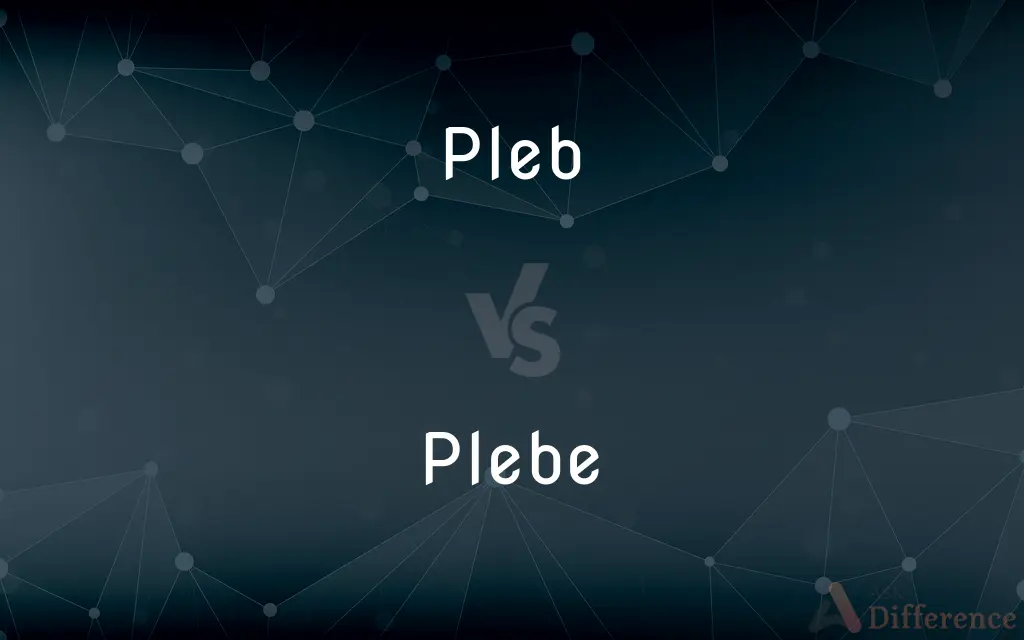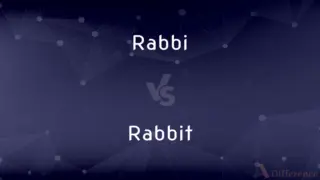Pleb vs. Plebe — What's the Difference?
By Tayyaba Rehman & Urooj Arif — Updated on April 30, 2024
Pleb refers to a common person or member of the lower social classes, originating from ancient Rome, while plebe is specifically used to denote a first-year cadet or student in a military or naval academy.

Difference Between Pleb and Plebe
Table of Contents
ADVERTISEMENT
Key Differences
Pleb is a term derived from the Roman "plebeian," which denoted members of the lower social classes in ancient Rome, emphasizing their common status and often lesser political influence. On the other hand, plebe is primarily used in modern contexts within military and naval academies in the United States to describe new cadets or students, focusing on their novice status and initial phase of training.
While plebs were historically significant in the socio-political fabric of Rome, participating in the Plebeian Council and eventually gaining political representation, plebes today are known for undergoing rigorous training and indoctrination processes aimed at integrating them into the military ethos. Whereas plebes experience a structured and transitional period meant to prepare them for military duties.
Plebs, in broader historical and cultural usage, often symbolize the common people or the masses, frequently referenced in discussions about social class and equity. On the other hand, the term plebe, though similar sounding, carries a specific institutional context, tightly linked with discipline and hierarchy within military settings.
Moreover, the term pleb has evolved into a pejorative or colloquial insult in some modern contexts, implying someone of lower status or lesser intelligence. Conversely, plebe, while also occasionally used dismissively by upperclassmen, retains a more neutral connotation within the academy, emphasizing the role as part of a rite of passage.
Comparison Chart
Origin
Ancient Rome, referring to lower social classes
Military academies, referring to new cadets or students
ADVERTISEMENT
Current Usage
Often pejorative, indicating a common or low-status person
Neutral, specific to military context for beginners
Cultural Significance
Symbolizes common people, highlighting social divisions
Represents a transitional phase of military training
Contextual Focus
Socio-political status in historical and modern settings
Institutional and hierarchical within academies
Connotation
Negative in some modern uses
Primarily neutral, with some internal hierarchical implications
Compare with Definitions
Pleb
A member of the lower social classes in ancient Rome.
In ancient Rome, plebs fought for political recognition and rights.
Plebe
A first-year cadet or student in a military or naval academy.
The plebes underwent a rigorous initiation week.
Pleb
A common person, often used pejoratively.
The politician's policies were criticized for favoring elites over the plebs.
Plebe
Used informally to describe a newcomer in any group or organization.
He felt like a plebe during his first days at the law firm.
Pleb
In historical context, refers to non-aristocratic citizens.
The plebs were essential in shaping Roman legislative reforms.
Plebe
In the context of military academies, a term used for the lowest rank of students.
Plebes must adhere strictly to the academy's rules and traditions.
Pleb
Someone considered unsophisticated or uncultured.
The artist dismissed his critics as uninformed plebs.
Plebe
Rarely, used beyond military settings to imply naivety or lack of experience.
As a new volunteer, she was treated as a plebe by the other members.
Pleb
Used in British slang to denote an ordinary person, sometimes humorously.
He considered himself a bit of a pleb when it came to fine dining.
Plebe
Sometimes used by upperclassmen to denote inexperience.
The seniors tasked the plebes with organizing the supplies.
Pleb
A commoner; a plebeian.
Plebe
A first-year student at the US Military Academy or the US Naval Academy.
Pleb
A commoner, a member of the lower class of a society.
Plebe
A plebeian, a member of the lower class of Roman citizens.
Pleb
(derogatory) A common person, an unsophisticated or cultureless person.
Plebe
The plebs, the plebeian class.
Pleb
A freshman cadet at a military academy.
Plebe
(obsolete) The similar lower class of any area.
Pleb
Of or concerning the lower class of a society.
Plebe
A freshman cadet at a military academy.
Pleb
(derogatory) Undistinguished, commonplace, unsophisticated, vulgar, coarse.
Plebe
The common people; the mob.
The plebe with thirst and fury prest.
Pleb
One of the common people
Plebe
A member of the lowest class in the military academy at West Point; also, a freshman at any military or naval academy.
Plebe
A military trainee (as at a military academy)
Common Curiosities
What are the main differences in the connotations of pleb and plebe?
Pleb often has a negative connotation, implying lower status, whereas plebe is more neutral, related to being a newcomer in a specific institutional context.
How is "plebe" specifically used in military contexts?
Plebe is used to denote first-year cadets or students at military and naval academies.
Are plebs and plebes viewed similarly in society?
Plebs are generally associated with the broader lower social classes historically, whereas plebes are specifically viewed as newcomers in military settings, reflecting different social and contextual implications.
How does the usage of "pleb" differ in modern British English compared to American English?
In modern British English, "pleb" can be a derogatory term but is also used humorously among peers, while in American English, its usage is less common and tends to retain its historical pejorative meaning.
Is "pleb" used in official documents or formal language?
"Pleb" is rarely used in formal language or official documents today; it is primarily found in colloquial speech or in historical discussions.
Why might someone use "pleb" as an insult?
"Pleb" might be used as an insult due to its historical implications of lower social status and its modern connotation of lacking sophistication or intelligence.
Can "pleb" be used in a positive way?
While historically neutral, in modern usage, pleb is often seen as pejorative unless used humorously or affectionately in casual speech.
How does the training of a plebe differ from typical student experiences?
Plebe training is intensely regimented and discipline-focused, differing significantly from typical student experiences by emphasizing military skills, order, and obedience.
Do both "pleb" and "plebe" have similar historical roots?
No, "pleb" has roots in ancient Roman social structure, while "plebe" originated more recently in the context of American military academies.
What is the historical origin of "pleb"?
Pleb originated from the Latin "plebeius," referring to the common citizens of ancient Rome.
What does it mean when someone is called a plebe outside of a military academy?
Outside of a military context, calling someone a plebe generally refers to their inexperience or newcomer status within any particular group or organization.
Can "plebe" be used in a professional setting?
It's uncommon and potentially inappropriate to use "plebe" in a professional setting due to its specific connotations to military hierarchy and inexperience.
What impact did plebs have on Roman society?
Plebs had significant impact on Roman society, notably through their struggles for political equality and rights, leading to changes in laws and social structures.
Is there a positive reclamation of "pleb" in any contemporary movements or groups?
There isn't a widespread reclamation of "pleb"; however, it is sometimes used within groups to signify solidarity among the common people against perceived elites.
Share Your Discovery

Previous Comparison
Rabbi vs. Rabbit
Next Comparison
Sublimate vs. DistillateAuthor Spotlight
Written by
Tayyaba RehmanTayyaba Rehman is a distinguished writer, currently serving as a primary contributor to askdifference.com. As a researcher in semantics and etymology, Tayyaba's passion for the complexity of languages and their distinctions has found a perfect home on the platform. Tayyaba delves into the intricacies of language, distinguishing between commonly confused words and phrases, thereby providing clarity for readers worldwide.
Co-written by
Urooj ArifUrooj is a skilled content writer at Ask Difference, known for her exceptional ability to simplify complex topics into engaging and informative content. With a passion for research and a flair for clear, concise writing, she consistently delivers articles that resonate with our diverse audience.
















































